- Home
- Thomas Cahill
A Saint on Death Row Page 5
A Saint on Death Row Read online
Page 5
Dominique did exempt some repeat visitors from his silent scorn, especially occasional visitors from Rome, exotic to him at first, then gradually welcomed for their evident seriousness and solidarity with his suffering. And he had come to have positive feelings toward David Atwood, founder of the Texas Coalition to Abolish the Death Penalty, who turned up regularly, offering books and other simple services, and seemed unlikely to go away. Dave, a retired chemical engineer, has dedicated his retirement to the service of Death Row inmates, their families, and the families of their victims. He is an even-tempered, mild-mannered man but quietly unswerving, even relentless in his dedication. He would help bridge the gulf that yawned between Sheila's good heart and Dominique's distrust by insisting to Dominique on more than one occasion that this ebullient female judge with the Chicago accent was O.K.
Sheila first met Dominique in the summer of 2000 on her birthday, August 18. She was not his chief attorney, nor could she be; that role had been awarded to court-appointed lawyers Mike Charlton and Gary Taylor, who could not be removed from Dominique's case except by a judge's order. Sheila was initially surprised to find Dominique especially keen on retrieving the videotape that he assumed had been made automatically by the security camera of the store in front of which Andrew Lastrapes had been shot nearly eight years earlier.
Dominique understood that whatever had been videotaped that night had long since been taped over. But he had also read that it was possible to restore by electronic manipulation some semblance of the taped-over images. He had not been able to get Charlton and Taylor's investigator, nor the investigator who had preceded him, to look into the matter. However hopeless such a quest might have proved, Dominique's urgency proved to Sheila that, although Dominique was unwilling to rat on the real murderer, he was eager to let the evidence speak for itself.
Sheila, however, could find nothing: the store manager looked at her blankly and shrugged. No one worked there who had worked there in 1992; no one knew what had become of the old tapes; no one knew anything that could give Sheila the least help. She returned to Dominique empty-handed.
But gradually, almost without realizing that it was happening, Sheila overcame Dominique's suspicion of her by leaving the subject of his case and talking about her family, especially about her husband and her children, a son, Patrick, and a daughter, Brigid, both a little older than Dominique. It was an intuitive strategy, one that any law school would advise its students against: under no circumstances do you open your personal life to your clients! But Sheila, a refreshingly open woman, impelled to candor by her own temperament as well as by her experience of fighting her addiction, can talk about her family members almost as if they are there with her in the room. Dominique was fascinated and amazed: here was a mother who had an easy and natural relationship with her grown children, a mutually respectful relationship that knew no rigidity, no strictures, but was full of humor, elasticity, love, and… pleasure. To Dominique, the casual chat of this woman on the other side of the glass hit him with all the impact of a revelation.
Tentatively, Dominique began to ask Sheila questions— about how she talked to Brigid and Patrick and how they talked to her. Though only dimly realizing what she was doing at first, Sheila was holding up to Dominique a dream beyond all his imaginings: she was giving him a practical education in the nuts and bolts of healthy family life, a realm that lay outside anything in his experience. Finally, Sheila succeeded in closing the circle that was slowly uniting her and Dominique: she asked Dominique about his family. He told her briefly of the many horrors and of his concern for his brothers, but then he found himself concentrating on the paternal grandmother he had loved and lost—the one person who had always believed in him—and the immense loneliness that had overwhelmed his nine-year-old world when she died. That day, Sheila realized, Dominique was trying to keep her there, prolonging her visit with whatever conversational gambit he could come up with. His decision earlier in that visit to cross the line into his private suffering—to tell her about his grandmother—had sealed their new relationship.
Sheila found herself giving Dominique as much attention as she gave her own children, sending him postcards and phoning when she couldn't visit. Eventually, she asked her son to visit Dominique. Sheila would always think of that visit as miraculous: the on-duty staff unaccountably allowed Patrick to remain far beyond the customary hour, and in that time an irrevocable transformation occurred. By the end of the visit, Dominique and Patrick were calling each other “brother”— and they both meant it. Dominique now knew himself to be a member of a family a family that wanted him.
There was another person whom Sheila was able to introduce to Dominique: her law clerk, Andrew Lofthouse, three years younger and three inches taller than Dominique, a middle-class, midwestern white boy with the rangy body of a tennis player (as opposed to Dominique's slightly squatter, more earthbound appearance), with whom Dominique could have expected to have little in common. Livingston was the first prison Andy ever found himself in—though he lacks the least hint of straight-laced rectitude and will refer obliquely to “my youthful indiscretions.” It was precisely Andy's zany playfulness, the dance of lights in his eyes that says, “I'm not always a good boy,” that appealed to Dominique, who possessed an obvious and irrepressible naughtiness of his own. Much of their bonding revolved around the usual male talk of sports and girls.
But if the predictable interests of men in their twenties helped the two to reach some common ground, Andy was perhaps the first person to get a fix on how intelligent Dominique was—and how manipulative he could be. “He figured this guy flew all the way down here, drove all the way up here, waited in line, this guy obviously wants to see me. It's just what people do to go on visits there. It's not easy to get to Livingston, Texas. And Dominique knew it and he had been having visits for eight or nine years by the time I got there; and so when I got there, I was one of a long line. And he knew how to manipulate every interview that he had. And he'd say in his letters, ‘Well, I'm going to have a visit’ or ‘I need a visit,’ and it was almost like his visits were his business meetings and he was the CEO. And I didn't recognize that until the second or third time I went down there. Because at first I thought he was desperate to meet me but the second or third time I went down I realized that the guy had a plan for this. These are his only outlets to an outside world. And I think Dominique over time certainly learned to trust me but I think he also respected me [because] I didn't really fall for a lot of his bullshit that a lot of the other visitors do.”
By calling some of Dominique's initial bluffs, Andy was rewarded not only with Dominique's respect but with a mutual friendship that became deeply rewarding for both men. We can almost listen in on their evolving conversation:
“Why did you lie to me the first time?”
“Down here you don't know who you can trust, and I didn't know if I could trust you. I didn't want to invest everything in you if you were going to just walk away. I didn't want to get any false hope that people might really care about my case this time.”
“Do you have much hope?”
“Hope is a loaded gun.”
Dominique was full of such gnomic one-liners, allusive, mysterious, sometimes profound. He called Andy Confucius, a name he might have applied aptly to himself. But Andy-Confucius came gradually to realize that it was Dominique's nearly absolute isolation that had brought this street kid to an intellectual and psychological flowering that might otherwise never have happened. “He was very streetwise upon going in and he became book smart, intellectually smart after some time there. I think a lot of that had to do with his isolation from society stressors that had been in his life the whole time, specifically the street and his mother. When he finally was put not in the general population where non-Death Row [inmates are housed] but in a solitary cell, in a strange way that same cell that theoretically protected us from him also protected him from us. That's why he blossomed. And he would say that over and over to me, ‘Y
ou know, being in here has made me the person I've always wanted to be.’”
Dominique Green, as removed from the world as any fourth-century Egyptian anchorite in his desert cell, was following an ancient path to spiritual enlightenment and personal transformation. Part of the formula, as had been the case for the desert fathers, was to look death straight in the eye. Andy suspected that Dominique “reconciled himself with the fact that they were going to kill him way before we even got involved in his case. He was on Death Row a long time, in which time they killed hundreds of people.”
But there was far more to Dominique's spiritual quest than a confrontation with the probability of early death. “I think he realized that he wasn't going to be able to do everything that he wanted in his life because they were going to kill him. And yet he wanted to at least do something so his life had some kind of value. And I think that's why he forgave his mother and why he tried to help other people on Death Row. I think that's why he allowed himself to trust me and to trust Sheila. I mean, he used me and I don't blame him. His job was to get himself out of there. I used him to get out of some classes in law school! What I was amazed at was here is some guy down in a cell in Texas in the middle of nowhere and he's orchestrating a worldwide campaign that he started. He wrote letters to everybody. He's the one who contacted people. He orchestrated this campaign from his little cell and he has people all around the world working for him and thinking about him. And to me that's the most amazing thing about him. Granted, it was to save his own hide, but I found that amazing. Especially when you go down there and see that there are hundreds of people on Death Row in Texas and maybe four or five have what he had by the end of his life.”
Indeed, a deepening familiarity with Dominique's case inspired the Community of Sant'Egidio to organize a worldwide movement to declare a moratorium on the use of the death penalty. As each new country signs on to this moratorium, the Roman Colosseum, ancient symbol of man's in humanity to man, is lit up in celebration. In addition, the Community has initiated a worldwide Cities for Life program. In concert with the illumination of the Colosseum, 760 cities in fifty-six countries have followed suit, each lighting up a local monument on the occasion of a new state signatory.
Perhaps more important than this strikingly public effort, the Community has succeeded, working with other organizations (such as Amnesty International), in encouraging the General Assembly of the United Nations to pass a resolution in favor of a moratorium. After the presentation by Sant'Egidio of more than five million signatures from 153 countries, all calling for a moratorium, the resolution passed the General Assembly on December 18, 2007, with 104 countries voting in favor, 54 against, among the latter China, Egypt, Saudi Arabia, Iran, and the United States of America. Since the passing of the resolution, additional countries have continued to sign on to this moratorium, either by legislative emendation or by outright abolition.
If Dominique was having an effect far beyond the immense gray walls of Livingston prison, there was also considerable drama taking place behind those walls, with Dominique as a principal player. Long before he began to reach out to his fellow prisoners, they reached out to him. Perhaps the most striking confirmation of this lies in the narrative Dominique wrote of his encounters with older inmates during his first years of imprisonment. This narrative was published, with Sheila's help, in the October 15, 2004, issue of National Catholic Reporter.
MORE THAN JUST A ROSARY
by Dominique Jerome Green
I really would enjoy it if one of the first things people noticed about me was the radiance of my smile. The conditions under which I live have robbed many here of the smallest traces of happiness that once could have been found at the very core of their being. So heads hanging down, faces plastered by frowns and defeatist attitudes are things you find here en masse. Which is why the simple fact that I can smile, I can laugh, I can allow myself not to take this seriously should be more than enough reason to capture folks’ attention, but it's not.
Instead, people are drawn to the black and blue rosary that adorns my neck, which is made of 101 beads, and which hangs to below my waist. As long as it is, and as stand-outish as it is, I don't know why I thought very little attention would be paid to it. But whatever the case may be, that was definitely wishful thinking on my part, because everyone who sees me ends up asking me questions about the rosary. The questions have ranged from gang-related to religious, from natural curiousness to understanding, from playfully humorous to sarcastic.
I used to not answer the questions. If I responded, I used humor or wit to put an end to or deflect the questions.
The reason I wear the rosary and have kept it for all these years was personal, something that only belonged to me. But recently, even my attorney asked about it when she came to visit.
The time had come, I decided, to finally talk about the rosary.
When I first arrived on death row, I was just a kid—one confused, smart-mouthed and belligerent kid. Fortunately, back then death row was nothing like it is now. Now we are all individually isolated. Then the environment was communal. I could interact with men who saw in me the potential to grow. Those men taught me, they mentored me, they helped me find myself. They showed me how to open my eyes and in turn open up my mind.
Today it's not like that. The communal environment that enabled me to grow is denied men who come here today men who need those teachers, those mentors and those spiritual guides to help them understand that coming here is not the end of their lives but merely a second chance.
That all sounds so easy now. But at first I couldn't accept or even fathom that concept. I was like, “How can you even call living here on Texas Death Row a second chance at life?” What finally allowed things to fall into perspective for me was when a friend, one of my mentors, was set to be executed.
He told me the fact that his number was being called and not mine was what would give me a second chance to use all the knowledge he had passed on to me to make a difference in someone's life. His words stuck to my heart.
With his passing, not only did I pick up his torch, but I also began making my rosary, bead by bead. Each bead represents a friend, mentor or spiritual guide of mine who has died and who gave me the chance to use their knowledge and wisdom to touch other lives.
I never expected my rosary to get so long. As messed up as the Texas judicial system is, I expected the courts or the people to eventually put a stop to what was going on down here.
But they haven't. And 11 years after I was sent here, the death toll continues to rise. More than 250 people have been executed since my arrival. I've known almost all of them. I chose to stop adding beads to my rosary at 101, because by then I understood how to use what I had learned to have an impact on the lives of others and to help make a difference.
Most men here will never get the chance to understand self-discipline from people like Paul Rougeau; how to have a sense of humor even when things are at their worst from people like Rick Jones; how to have whole countries believing in them and showing an outpouring of support to free them like Odel Barnes; how to be a friend and big brother like no other like Vincent Cooks; how to never let this place break one's mind, body or spirit like Emerson Rudd; how to lead by being a follower like Ponchai Wilkerson; how to make people change their beliefs in capital punishment as did the wrongfully executed Gary Graham; and how to look at being here as having a second chance at life like Da'woud.
Those are lives my rosary reflects. So no, it doesn't bother me that my smile is not and probably won't ever be the first thing people notice about me. After all, its radiance is allowed to come from what I wear around my neck anyway.
As any writer can attest, the straightforward simplicity of Dominique's prose is no simple matter. It is a hard-won achievement, made possible by vigilant exercises of mind and agonizing attention to writing skills. The mind's usually un-differentiated potpourri of half-thoughts and impressions must be sorted into clear and usable thoughts, which mus
t then be expressed in a common English that readers can connect with. If we compare “More Than Just a Rosary” to Dominique's letter of June 13, 1995, to Stefania (pages 47-50), written more than nine years earlier, we encounter the same warm Dominique, but now possessed of a clarified eloquence and ability to communicate with others that come close to endowing his words with the impact of a professional writer. In Dominique we discover a true autodidact, who has used his desert cell as a school of self-improvement.
Dominique's solitary reflections also impelled him to provide more systematic assistance to his fellow inmates. Some of his attempts, such as the creation of football pools, may seem trivial, but only if you have never thought about what it would be like to live along Death Row. Dominique set up the football pools and bought off the guards so he could get his flyers passed around. Inmates would circle their favored teams, and each Monday Dominique would “announce” the winner and make sure the winner got everything that was coming to him. When you have little or nothing to look forward to, such an activity can reestablish some of the surprise and adventure of normal life. And beyond introducing the jump and thrill of the unknown, the football pool was a heroic attempt to create, as Andy Lofthouse saw it, “a sense of community there among the people on Death Row.”
But far beyond football, Dominique spent much of his time helping his fellow inmates to understand the mysteries of Texas law. By diligent reading of the law books his supporters supplied him with, he had come to have an excellent grasp of his own case, which gave him the ability to enlighten others as to their real situation and its likely remedies. He understood both the probabilities and the occasional opening for a daring strategy, and he was constantly engaged in giving advice to others who were younger and less skilled than he.

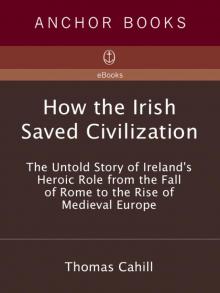 How the Irish Saved Civilization
How the Irish Saved Civilization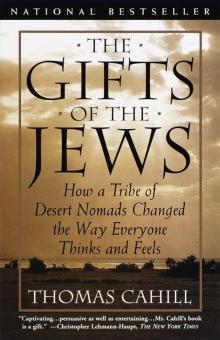 The Gifts of the Jews
The Gifts of the Jews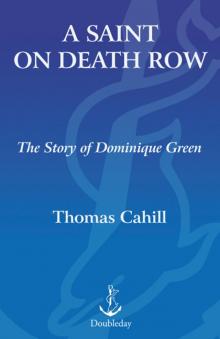 A Saint on Death Row
A Saint on Death Row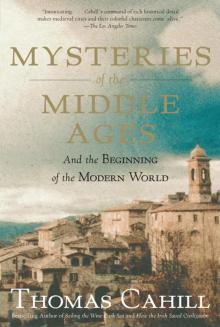 Mysteries of the Middle Ages
Mysteries of the Middle Ages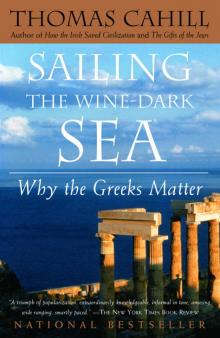 Sailing the Wine-Dark Sea
Sailing the Wine-Dark Sea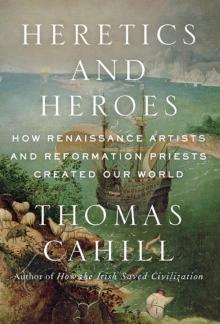 Heretics and Heroes
Heretics and Heroes Desire of the Everlasting Hills
Desire of the Everlasting Hills